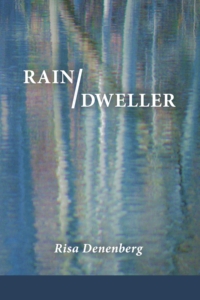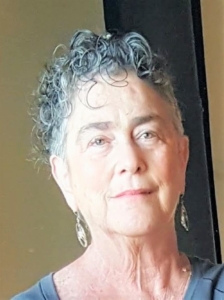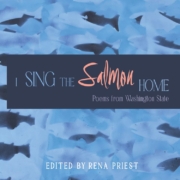Risa Denenberg: RAIN/DWELLER
 RAIN/DWELLER, Risa Denenberg. MoonPath Press, P.O. Box 445, Tillamook, OR 27142, 2013, 96 pages, $16.99, paper, http://MoonPathPress.com.
RAIN/DWELLER, Risa Denenberg. MoonPath Press, P.O. Box 445, Tillamook, OR 27142, 2013, 96 pages, $16.99, paper, http://MoonPathPress.com.
Yes, it IS National Poetry Month. Instead of my usual every-day-in-April poetry-binge, I am committed to reading a book of poems each week this year, and posting a review here. So far I think I’m 13/14, but this week I’m determined to catch up.
For the last couple of days I have been reading Risa Denenberg’s Rain/Dweller. The poems are, as Rena Priest says in her cover blurb, “honest and unflinching.” They are also, Priest continues, “temper[ed] with tenderness, vulnerability, beauty, and delight.” Indeed. David Guterson says of reading these poems: “Part of the loveliness for me was the expectation of arriving at yet another arresting line—of being brought to a halt by something piercingly true.” These 71 poems remind us that if difficult truths are … well, difficult … there is something beautiful about looking closely, unflinchingly, at them.
Rain/Dweller embraces loss; AIDS and Covid play important roles here, as does aging, parenthood, and climate change. “I dreamt you went missing, left without luggage” one poem begins (“Selfie with Baggage”); another, “Start with the cracked teapot” (“Intestate”). A family nurse practitioner, Denenberg writes in “The Fragrance of Crushed Fruit”: “O death: you are not a river, but I have careened your banks / my whole career, studying your silences, / submitting to your elegies.” In “Remembering Rachel Carson”: “I can’t revive my dad or MLK, all my corpses, the / homeless sleeping in parks under statues, the ruined / earth, Rachel Carson’s eyes.” Were it not for the tenderness, the beauty and delight, it would be too much to take in.
As an example of the “unflinching honesty,” I want to share one poem from the sonnet sequence, “Post-Human.” This is a 19-poem chronicle where Denenberg calls things by their right names, and calls us to accountability:
We know we’re unprepared for what’s in store.
We won’t be going home again. What was home
anyway? Wonder Bread and Log Cabin syrup?
Pabst Blue Ribbon and Twinkies? Or was it where
we learned that the birthday balloons we released
did not go to heaven; they killed turtles. We buried
pets in the backyard and fled across continents.
Too late I saw it was I who colonized, sanctioned
slavery, flattened Hiroshima. Our bodies contain
sewage, double lattes, oncogenes. We angst about
the planet and fill our homes with shit. We plug
the ocean with plastic and expect lunch at noon,
milk and crackers at bedtime. Truth time:
we’ve committed the unforgivable and buried it.
—Risa Denenberg, from “Post-Human” (p. 31)
In the first poem, “Old Trees, Old Lovers: A Postscript,” Denenberg writes, “I love what is gnarly, what is braided— /  banyans and mangroves, the hued peeling bark of madronas— / in the same way I love my worn, battered boots. / I know my position. I’ve unwound my watch.”
banyans and mangroves, the hued peeling bark of madronas— / in the same way I love my worn, battered boots. / I know my position. I’ve unwound my watch.”
Owning and owning up to what is gnarly, braided, battered, unwound strikes me as a good place to start if we want to effect real change in the world.
Denenberg has written eight collections of poetry. To read more about her, begin with her website (and read one of my favorite poems in the book, “Enough Beauty in This World”) at https://risadenenberg.com.








A question for you: How do you choose which books to review? And where do you find them? (OK, I guess that’s two questions.)
Rita – this is a great question. I have a habit of impulse-buying books, sometimes in bookstores, sometimes via a used-book on-line venue such as Thrift Books. I attend a lot of poetry readings, and often end up bringing books home, signed by the author. Buying poetry books is a good habit, of course, but I don’t always make time to read the books all the way through. I have a huge TBR (to be read!) stack. Reviewing helps me to catch up.
Last fall I was invited to be part of the MoonPath book exchange, and I took full advantage of this, trading books with everyone who joined.
More and more, people (even complete strangers) send me their books, and I’ve had a couple requests from journals to review.
I don’t try to “big deal” the reviews, at least not the ones posted to the blog. By that, I think I mean it doesn’t matter if I fall madly in love with the book or just find it interesting; reading it all the way through sells me on some aspect, and maybe gives me an idea for a poem. I appreciate the process. I think of my job being to 1) celebrate the author’s achievement, and 2) helping a reader, one who needs exactly this book, to find it.
Thank you! I was wondering how you don’t go broke! And I love the idea of a book not having to be a big deal. I’m admiring your goal of a book a week–and I like this better than one for every day of poetry month. (That was a bit overwhelming for me.) Bit also, I miss your other kinds of posts. Alway like to hear about your process.
I should admit, I spend a shocking amount of money on books. As my daughter told me when she was a teenager and wanted me to buy her a hardback book, “At least I don’t do drugs!”
Thanks for the other part of your comment, too, Rita. I’ll keep that in mind.